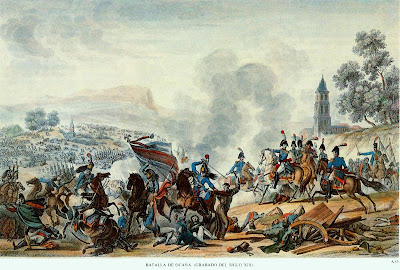The battle of Ocaña (november 19, 1809)
 The battle of Ocaña (Toledo) took place in november 19, 1809 between the Spanish troops of the Ejército del Centro (Army of the Center), under General Areizaga, and the French army led by the king Jose I, with Soult as Major General. The battle finished with the Spanish defeat and ended the fall campaign of 1809, in which the Junta Suprema (against the advise of Wellington) planned a double offensive, in which the Army of the Left operating around Salamanca, would attract the French Reserves (actually winning in Tamames), thus allowing the advance of Areizaga towards Madrid.
The battle of Ocaña (Toledo) took place in november 19, 1809 between the Spanish troops of the Ejército del Centro (Army of the Center), under General Areizaga, and the French army led by the king Jose I, with Soult as Major General. The battle finished with the Spanish defeat and ended the fall campaign of 1809, in which the Junta Suprema (against the advise of Wellington) planned a double offensive, in which the Army of the Left operating around Salamanca, would attract the French Reserves (actually winning in Tamames), thus allowing the advance of Areizaga towards Madrid.
Areizaga advanced towards the capital, commanding a force comprising 46,000 infantry (7 infantry divisions and an advance guard) and 5,000 cavalry, whereas, on the other side, Soult had 27,000 infantry and 5,000 cavalry (Sebastiani's IV Corps and Mortier's V Corps, Desolles's Reserve with the Royal Guard and 3 cavalry divisions). Previously to the battle, 3,000 French cavalry (under generals Paris and Milhaud) dispersed 4,000 Spaniards (under Freire) causing them some hundreds of losses, in the greatest cavalry combat of the Peninsular War. The next day, november 19, Areizaga retreated searching for an advantageous position, but he was intercepted by Soult and forced to deploy in a very unfavorable place and without no geographic support, around the town of Ocaña. The massed French cavalry charged against the Spanish right flank routing the Spanish cavalry, and then attacked the flanks of the Spanish line, while the French and German infantry attacked its front. The Spanish divisions dispersed one after another one, being pursued by the French cavalry.
The next day, november 19, Areizaga retreated searching for an advantageous position, but he was intercepted by Soult and forced to deploy in a very unfavorable place and without no geographic support, around the town of Ocaña. The massed French cavalry charged against the Spanish right flank routing the Spanish cavalry, and then attacked the flanks of the Spanish line, while the French and German infantry attacked its front. The Spanish divisions dispersed one after another one, being pursued by the French cavalry.
Spanish losses were around 4,000 men, but the French also took 14.000 prisoners, 50 guns, 30 flags and all the Spanish baggage. French reported 2,000 casualties. One week later, the Army of the Left was also routed in Alba de Tormes, and the Junta Suprema left Seville retiring to the island of León in Cádiz.
The best Spanish book on that battle and campaign is:
Title: La Batalla de Ocaña : campañas militares en la provincia de Toledo en 1809
Authors: Florencio Ontalba Juárez y Pedro Luis Ruiz Jaén
Edited by: Diputación Provincial, 2006
ISBN 84-96211-17-7 


































http://www.youtube.com/watch?v=fGEfwmR3QS8
ReplyDeletePor si no lo coneceís la canción de la época rescatada del olvido por el musicólogo Joaquín Díaz.
Warfare is a fascinating subject. Despite the dubious morality of using violence to achieve personal or political aims. It remains that conflict has been used to do just that throughout recorded history.
ReplyDeleteYour article is very well done, a good read.
Muchas gracias por tus amables palabras con respecto a nuestro libro.
ReplyDeleteGracias a Julio Porres y a la Diputación por editarlo. Muchas fueron las horas empleadas en su investigación y escritura...pero valió la pena. Pusimos en valor a aquellos españoles injustamente olvidados en esta batalla.
Muchas gracias de parte de Pedro y mías.